Highway strip
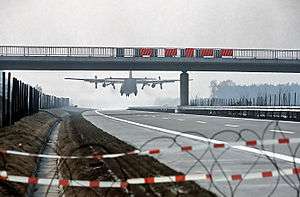
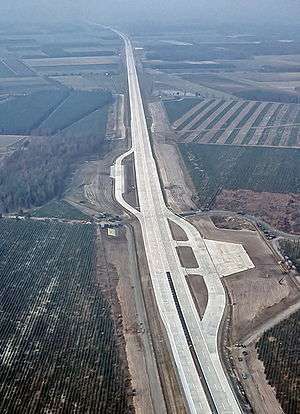
A highway strip or road runway is a section of a highway or motorway that is specially built to allow landing of (mostly) military aircraft and to serve as a military airbase. These were built to allow military aircraft to operate even if their airbases, the most vulnerable targets in any war, are destroyed. The first highway strips were constructed near the end of World War II in Nazi Germany, where the well developed Reichsautobahn system allowed aircraft to use the motorways. In the Cold War highway strips were systematically built on both sides of the Iron Curtain, mostly in the two Germanys, but also in North Korea, Republic of China (Taiwan), Sweden, Finland, Switzerland,[1] Poland, Pakistan and Czechoslovakia.
Design
The strips are usually 2 to 3.5 kilometres (1.2 to 2.2 mi) long straight sections of the highway, where any central reservation is made of crash barriers that can be removed quickly (in order to allow airplanes to use the whole width of the road), and other features of an airbase (taxiways, airport ramps) can be built. The road will need a thicker than normal surface and a solid concrete base. The specialized equipment of a typical airfield are stored somewhere nearby and only carried there when airfield operations start. The highway strips can be converted from motorways to airbases typically within 24 to 48 hours. The road would need to be swept to remove all debris before any aircraft movement could take place. In the case of Finnish road airbases, the space needed for landing aircraft is reduced by means of a wire, similar to the CATOBAR system used on some aircraft carriers.[2]
Examples
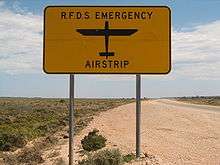
Nations known to utilise the strategy of highways constructed to double as auxiliary airbases in the event of war are Singapore, Sweden[3] (vägbas, literally meaning "road base"), Finland (maantietukikohta), Germany (NLP-Str - Notlandeplätze auf Straßen, emergency airfields on roads), Poland (DOL - Drogowy Odcinek Lotniskowy, lit "road airfield section"),[4] Republic of China (Taiwan) (戰備跑道 , lit. "war spare runway"), and the former USSR (Аэродромный Участок Дороги, "airfield part of road").
After the Turkish invasion of Cyprus, three highway strips were built in the Greek part of Cyprus, easily recognisable by a runway centre line and markings for the touchdown zone. They also all have aircraft turning areas at either end. One is located on the Limassol–Nicosia Highway (5,200 m or 17,100 ft) and one of the Limassol–Larnaca highway (5,000 m or 16,000 ft).[5] The third is a much smaller strip located on the Limassol-Paphos Highway near to Paphos International Airport.[6]
In Poland, as of 2003, only one highway strip is used annually for an exercise.[7]
In Pakistan, The M-1 Motorway (Peshawar-Islamabad) and the M-2 Motorway (Islamabad-Lahore) each include two emergency runway sections of 2,700 m (9,000 ft) length each. The four emergency runway sections become operational by removing removable concrete medians using forklifts. The Pakistan Air Force (PAF) has used the M2 motorway as a runway on two occasions: for the first time in 2000 when it landed an F-7P fighter, a Super Mushak trainer and a C-130 and, again, in 2010. On the last occasion, the PAF used a runway section on the M2 motorway on 2 April 2010 to land, refuel and take-off two jet fighters, a Mirage III and an F-7P, during its Highmark 2010 exercise.[8]
In regional Australia, several sections of highway are maintained as potential runways for use by the Royal Flying Doctor Service of Australia.
Sweden started to build a few 1,500 m road strips from around 1949. The Six-Day War in 1967 (where the Egyptian Air Force was grounded by a quick surprise attack on air bases) inspired further development. The Viggen fighter/bomber was designed for shorter and narrower road strips which were built in fairly high numbers.
India has successfully tested its runway strip on a stretch of the Yamuna Expressway in Uttar Pradesh on 21 May 2015.[9] It was built at a cost of ₹13,000 Cr for its combat jets of the IAF, a first for military aviation in the country. In June 2016, the Minister for Road Transport and Highways, Nitin Gadkari announced that the government was considering developing 'Road Runways' for commercial operations as well.[10]
Gallery
- Road runway section on Pakistan's M-1 Motorway with removable medians
- Road runway section on Pakistan's M-2 Motorway with removable medians
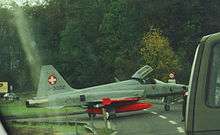 A Swiss Air Force F-5E Tiger II crossing a road between the runway and an aircraft cavern (Mollis airfield, 1999).
A Swiss Air Force F-5E Tiger II crossing a road between the runway and an aircraft cavern (Mollis airfield, 1999).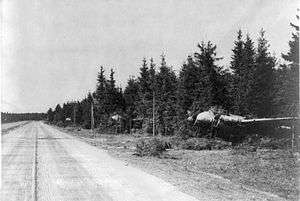 German Reichsautobahn strip in World War II (spring 1945), with Ju 88 heavy fighters parked on the shoulders
German Reichsautobahn strip in World War II (spring 1945), with Ju 88 heavy fighters parked on the shoulders An A-10 Thunderbolt II aircraft lands on the autobahn A29 near city of Ahlhorn during NATO-exercise "Highway 84".
An A-10 Thunderbolt II aircraft lands on the autobahn A29 near city of Ahlhorn during NATO-exercise "Highway 84". Rear view of an A-10 Thunderbolt II aircraft as it takes off from the autobahn A29 near city of Ahlhorn during NATO-exercise "Highway 84".
Rear view of an A-10 Thunderbolt II aircraft as it takes off from the autobahn A29 near city of Ahlhorn during NATO-exercise "Highway 84".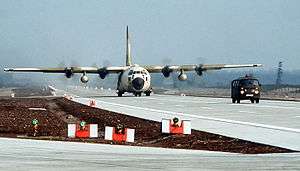 C-130 Hercules aircraft on taxidrive on the autobahn A29 near city of Ahlhorn during NATO-exercise "Highway 84".
C-130 Hercules aircraft on taxidrive on the autobahn A29 near city of Ahlhorn during NATO-exercise "Highway 84".- A South Korean Air Force Fairchild C-123K Provider aircraft waits to pick up troops at a highway landing strip during the joint South Korean/United States exercise "Team Spirit '89" on 24 March 1989.
See also
References
- ↑ Swiss Air Force, Uno Zero Zero – Ein Jahrhundert Schweizer Luftwaffe, Aeropublications, 2013, 324 pages (ISBN 978-3-9524239-0-5).
- ↑ "Puolustusvoimat" (in Finnish). Ilmavoimat.fi. Archived from the original on 25 June 2009. Retrieved 2015-12-17.
- ↑ "Military Aviation in Sweden". http://www.avrosys.nu. External link in
|work=(help) - ↑ Combat Aircraft (European Edition) (magazine), September 2003, page 78
- ↑ "Abandoned and Little-known Airfields: Cyprus, District Larnaca".
- ↑ "Abandoned and Little-known Airfields: Cyprus, District Paphos".
- ↑ Combat Aircraft (European Edition) (magazine), September 2003, pages 76-79
- ↑ http://www.paf.gov.pk/press_release/uploaded/MOTORWAY-RELEASE02-04-10.pdf
- ↑ "Indian Air Force(IAF) Mirage -2000 Lands at Yamuna Expressway". Press Information Bureau. 2015-05-21. Retrieved 2016-06-25.
- ↑ Kumar, Deepak (21 June 2016). "Turning roads into runways may be a stretch and here is why". Moneycontrol.com. Retrieved Jun 25, 2016.
External links
![]() Media related to Highway strips at Wikimedia Commons
Media related to Highway strips at Wikimedia Commons